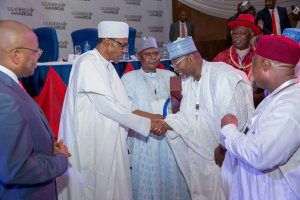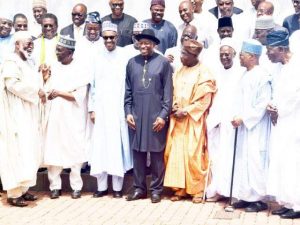After nearly four years of keeping the world waiting, former president, Dr. Goodluck Jonathan is set to speak on what happened in that uncertain and critical moment in 2015 presidential election when the votes were being counted and when the world held its breath on what happens to Nigeria next. The former president is doing so through a book titled My Transition Hours. The book is promising insights into the 2015 presidential election and “personal reflections on some key decisions by His Excellency”, according to the statement announcing the book presentation taking place Transcorps Hotel, Abuja midday, November 20th, 2018.

Buhari collecting the prize from then INEC boss, Prof Attahiru Jega
For the first time, how Dr Jonathan understood what happened in that election and why he reacted the way he did – conceding defeat – will be heard from the horse’s mouth as they say. A few writers, most notably journalist Segun Adeniyi in his Against the Run of Play have already burrowed into how an incumbent president in Nigeria lost power. While Dr Jonathan might not be going for anyone’s jugular when he himself speaks on 2015 tomorrow, it is most unlikely he will not be tearing someone else’s truth into pieces, thereby inaugurating some controversy. Whatever revelations from him could serve as lessons for 2019 elections in which the dramatis personae have remained the same. While it was Jonathan versus Buhari/Atiku in 2015, it is now Buhari versus Atiku, Buhari being the constant star.
Tomorrow’s occasion parades President Buhari as the Special Guest of Honour, John Mahama, former president of Ghana as the Guest of Honour, former president Olusegun Obasanjo as Chairman of the occasion, former Chief Justice of Nigeria, Alfa Belgore as the book reviewer and General TY Danjuma as the Chief presenter. The presence of Dr John Mahama in the above list is what is not easy to explain. It must hover between him being one of Jonathan’s enduring relationships or he is some envoy of peace by an extra-Nigerian interest. It could also be both because, clearly, the divide between the caucus of the foremost retired Generals and President Buhari is already very wide. The foremost retired Generals are widely believed to be the real backbone of the Atiku Abubakar gambit, to the extent of getting Obasanjo to edit his opposition to his former Vice-President.
Thereafter, those shouting Atiku as embodiment of corruption could be said to be engaging in hysteria because of the difficulty of outflanking such consensus against anybody, whether he or she is an incumbent. Historically, no incumbent has succeeded in doing that, be it IBB, Abacha, Obasanjo or Jonathan himself. It remains to be seen if Buhari would reverse the trend in 2019.
In Jonathan’s case, he not only quickly got the message, he also responded in a gentlemanly way and his image has been rising to the point that he can lay claims to being the conscience of the nation today for simply walking the talk that his second term was not worth the blood of any Nigerian.
 If all or most of the above big names attend the book presentation, he would have been adding value to himself in terms of an emerging unifier who could bring quarreling big guns under one roof at a very tense moment in their relationship, especially IBB and Buhari but now OBJ, TY Danjuma and Buhari. One charged Buhari with being rigid and uncompromising in matters of national importance; another one charged him with unleashing renegade killers on a region of the country while the third charged him with nepotism – obviously a code word for a transgression or crossing a red line in the group article of faith in ruling Nigeria.
If all or most of the above big names attend the book presentation, he would have been adding value to himself in terms of an emerging unifier who could bring quarreling big guns under one roof at a very tense moment in their relationship, especially IBB and Buhari but now OBJ, TY Danjuma and Buhari. One charged Buhari with being rigid and uncompromising in matters of national importance; another one charged him with unleashing renegade killers on a region of the country while the third charged him with nepotism – obviously a code word for a transgression or crossing a red line in the group article of faith in ruling Nigeria.
Although they are no more physically involved in politics, those of them such as IBB is undisputedly a card carrying member of the People’s Democratic Party, (PDP). While Obasanjo is no longer a party member and General Abdulsalami never quite so, General Danjuma has never been a politician as such. Still, in the event that he wins, Atiku will not exercise power without them in terms of the grand narrative.
By whatever means a Jonathan brings this hostile band together, he is gaining on moral high ground. There are no empirical details Jonathan would give out tomorrow that would challenge current thinking of Nigeria as being weakly located in global political economy. However, his empirics can shed light on the self, agency and history making.




























